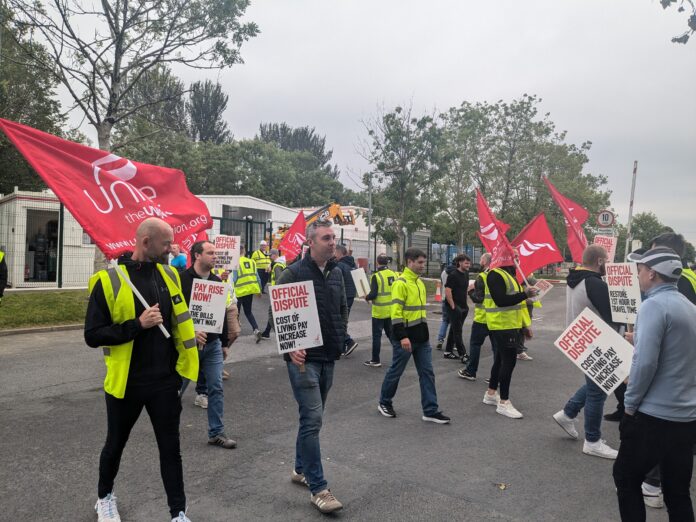
MECHANICAL workers at a number of key sites across Limerick joined their colleagues nationwide on a 24-hour picket line today (Friday) in protest over the breakdown of pay talks between Unite the Union workers and the Mechanical Engineering and Building Services Contractors’ Association (MEBSCA).
Protesters, who turned out at specifically-chosen key development sites for a number of major multinational businesses operating in Ireland – including Eli Lilly, Analog Devices, and the ESB in Limerick – called en masse for the rectifying of historic cuts in travel pay they say have lingered for over a decade.
Unite the Union members, including plumbers, pipefitters, and apprentices, petitioned for the restoration of compensation for the first hour of travel expenses (or ‘travel time’), which a Union representative said would be equal to around 12.8 per cent of an average day’s pay.
The ‘travel time’ hour’s pay was taken away from workers following budget cuts as a result of the 2008 financial crash.

- External Walls: Up to €8,000 Grant
- Attic: Up to €1,500 Grant
- Cavity Walls: Up to €1,700 Grant
- Internal Dry Lining: Up to €4,500 Grant
The union argues that while profits in the sector have surged, workers have been left behind, struggling with rising living costs.
James McCabe, a Unite the Union representative leading the picket line at the Analog Devices campus in Limerick, expressed frustration over the breakdown of negotiations between the union and MEBSCA last week.
“Since they left the pay talks last week, (MEBSCA) offered zero per cent, and we haven’t had any engagement from them since then,” he said.
“The only thing they want is for us to apply for a sectoral employment order (SEO). We have no problem with that; it creates a level playing field.”
An SEO would standardise pay and conditions across the mechanical sector, ensuring that all contractors are required to pay the same rates.
Mr McCabe argues this would result in no competitive disadvantage for MEBSCA employers while securing a reasonable pay increase for workers.
One worker who took to the picket lines in Limerick, Kevin Murphy, said that the first hour of travel pay is paramount for workers, who face rising costs of living.
“In our industry, you could be told to travel up the country on short notice. Fuel prices are not going down; they’re going up. Seems like our money should go up too,” he said.
A MEBSCA spokeswoman told the Limerick Post that the association is “extremely disappointed that its members are yet again being targeted by Unite for additional increases in pay”.
“It is only eight months since MEBSCA entered into an agreement with Unite, which will yield pay increases for Unite members of 12.8 per cent. Unite is now seeking to double this increase despite the fact that this agreement does not expire until May 2026.”
The spokeswoman further stated that “MEBSCA members pay a travel allowance on top of pay. An agreement was entered into with Unite at the Workplace Relations Commission in 2011, which incorporated the first hour of travel into hourly rates. This agreement had the effect of increasing the hourly rate which also resulted in a higher rate being paid for overtime and holidays.”
She hit out at the fact that “Unite is now seeking to maintain the higher rate of pay while also seeking to reverse the agreement that was freely entered into by Unite at that time”.
“Plumbers and fitters employed by MEBSCA members are the highest paid workers in the construction industry. Pay agreements negotiated with Unite have been reviewed on several occasions since 2011, with the most recent pay increase being applied on 5th August 2024”.
“MEBSCA will continue to honour all agreements entered into and we urge Unite to do likewise,” she said.
Outside of Limerick, workers have taken to picket lines at Diageo in Dublin, an intel site at Leixlip, Kildare, and another Eli Lilly site in Cork – all sites which protesters believe could lead to serious costs for some of the largest companies operating in the state.
While the strike started with four planned consecutive Fridays of action, Unite representative James McCabe said there is room for escalation, hinting that further strikes may take place if progress isn’t made.
“We’re not saying give us that 12.8 per cent increase today, that’s unrealistic, we get that. But let’s look at a structure or formula (to implement the pay]) over 12, 18, or 24 months,” he said.

